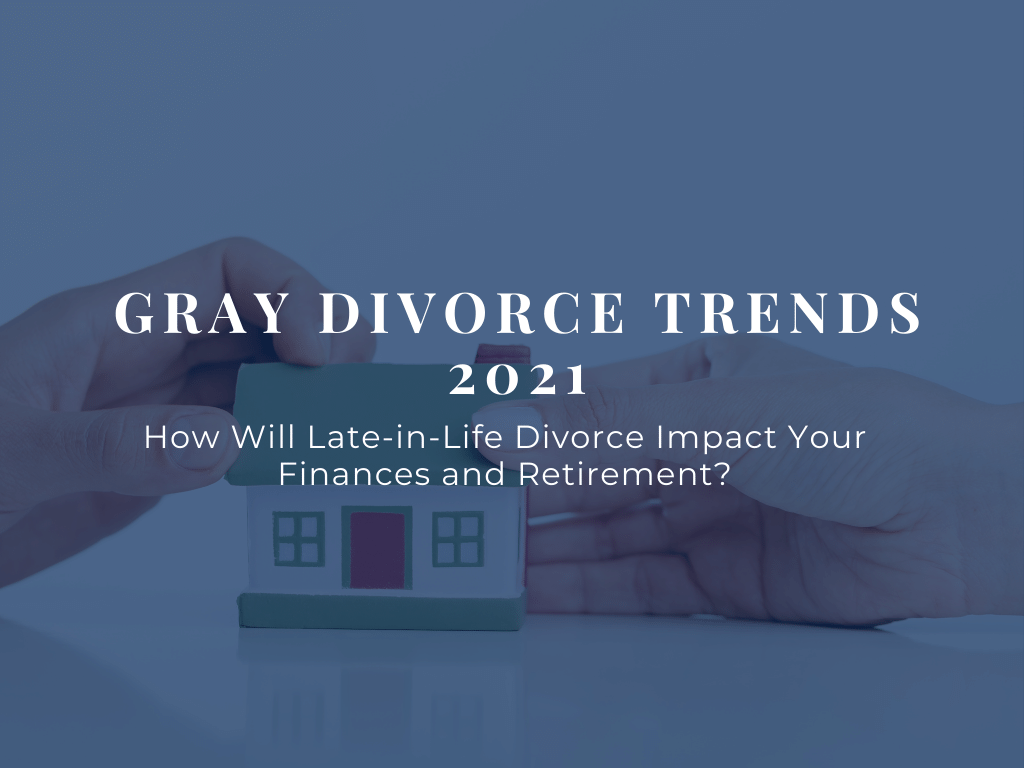
After many years where the divorce rate for American adults was constantly on the rise, recent decades have shown a modest decline. However, those statistics disguise a change in the divorce rate for older adults. According to multiple studies, including a Bowling Green State University Family Profile Information 2021, there has been an increase in the divorce rate for those who are 50 years and older.
This so-called gray (think graying hair) divorce phenomenon can have a significant impact on retirement plans. If you are older and considering a divorce, keep in mind that assumptions you and your spouse made decades ago about finances may no longer apply, including the financial benefits of marriage.
Several high-profile gray divorces have been in the news recently, including Bill and Melinda Gates. Let's assume that dividing up their assets will be a bit more complicated than what you might be facing if divorce is likely. However, there are practical considerations for all non-billionaires when dealing with the financial consequences of a divorce.
General Assumptions About Retirement and Gray Divorce
There are some rather obvious adverse outcomes from a financial standpoint that you should expect from a marriage dissolution. The advantages that come with two incomes and a sharing of expenses are no longer applicable. So consider that some economic hardship may be inevitable.
There are federal tax benefits that are currently only available to married couples filing jointly. Broadly speaking, married couples can double certain tax benefits when compared to filing as a single. You will forego these benefits once you are on your own.
Gray Divorce Finances: Steps You Can Take Pre-Divorce
It is relatively common that one spouse is significantly more knowledgeable regarding family financial matters than the other. These finances would include retirement accounts and retirement planning.
For both spouses, it is your responsibility to be financially informed when it comes to your own current and retirement resources. It will be significantly more difficult to successfully navigate your divorce from a financial standpoint if you are starting at square one.
At a minimum, you should have access to and understand what is in the credit reports for you and your spouse. Review tax returns for the last few years. Make sure you understand the details. Review the location of your assets and balances. Make sure you can access everything. (Divorce or no divorce, everyone should know the location of assets and balances.)
If you are still uncomfortable with your level of financial understanding, consider meeting with a financial advisor who can bring some clarity to your particular situation.
Financial Steps After the Gray Divorce Is Final
In the near term after divorce, you will need a budget that reflects your new economic reality. Determine your income sources and estimate your expenses. How will this new reality impact your lifestyle? Recognize that changes to your budget and lifestyle will also affect your retirement planning.
Part of any retirement planning involves determining certain time horizons. How long do you want to work? How long do you need to work? Carefully consider these questions as you reassess your retirement goals.
Dividing the Assets
When a long-term marriage is involved, you can generally assume a 50/50 split of assets and liabilities in a divorce settlement. In states with community property laws, this would include assets and liabilities that are only in one spouse’s name.
For many Americans today, especially those in or nearing retirement, the assets with the greatest value may be the family home and a 401(k) account. Tax consequences are an important consideration in the disposition of these assets.
Home Disposition Considerations With Gray Divorce
Decisions regarding the home will likely revolve around whether or not to sell the property and split the proceeds. Is there an emotional attachment by one of the parties? Can either spouse afford the house alone? If the house is to be sold, bear in mind that the amount to be split will be net after paying off the mortgage, any home equity loans and broker fees.
401(k) Accounts
The administration and redemption rules for these retirement accounts vary by plan. Benefit provisions are determined by each individual plan and need to be thoroughly reviewed in advance of a divorce settlement. Some allow a distribution at the time of the divorce, while others only upon the recipient’s retirement.
The most common ways of dividing 401(k) in a divorce are as follows:
- One spouse retains the account, and the other spouse accepts other assets of comparable value. This is the simplest approach in many instances.
- Both parties agree to an even split of the account. This requires a court order known as a Qualified Domestic Relations Order (QDRO). It creates the right for an alternate payee (ex-spouse) to receive all or part of an account.
- The account is liquidated. Generally, this option is the least favorable given the negative impact of the tax event that is triggered.
Please speak to an advisor to help review your specific options.
Gray Divorce Impacts on Retirement Conclusion
Very few people expect going through a divorce to be a great experience. However, you can lessen your apprehension about the impact on your retirement plans by taking some common sense steps to prepare yourself. Engaging a financial planner during the course of a gray divorce can produce many benefits for your financial livelihood. Qualified advice regarding options you have available about items like the QDRO will make your life as a single much more financially sound.
Need a Financial Advisor?
If you are currently looking for help with financial planning, contact us. We are happy to schedule an introductory meeting at your convenience.


